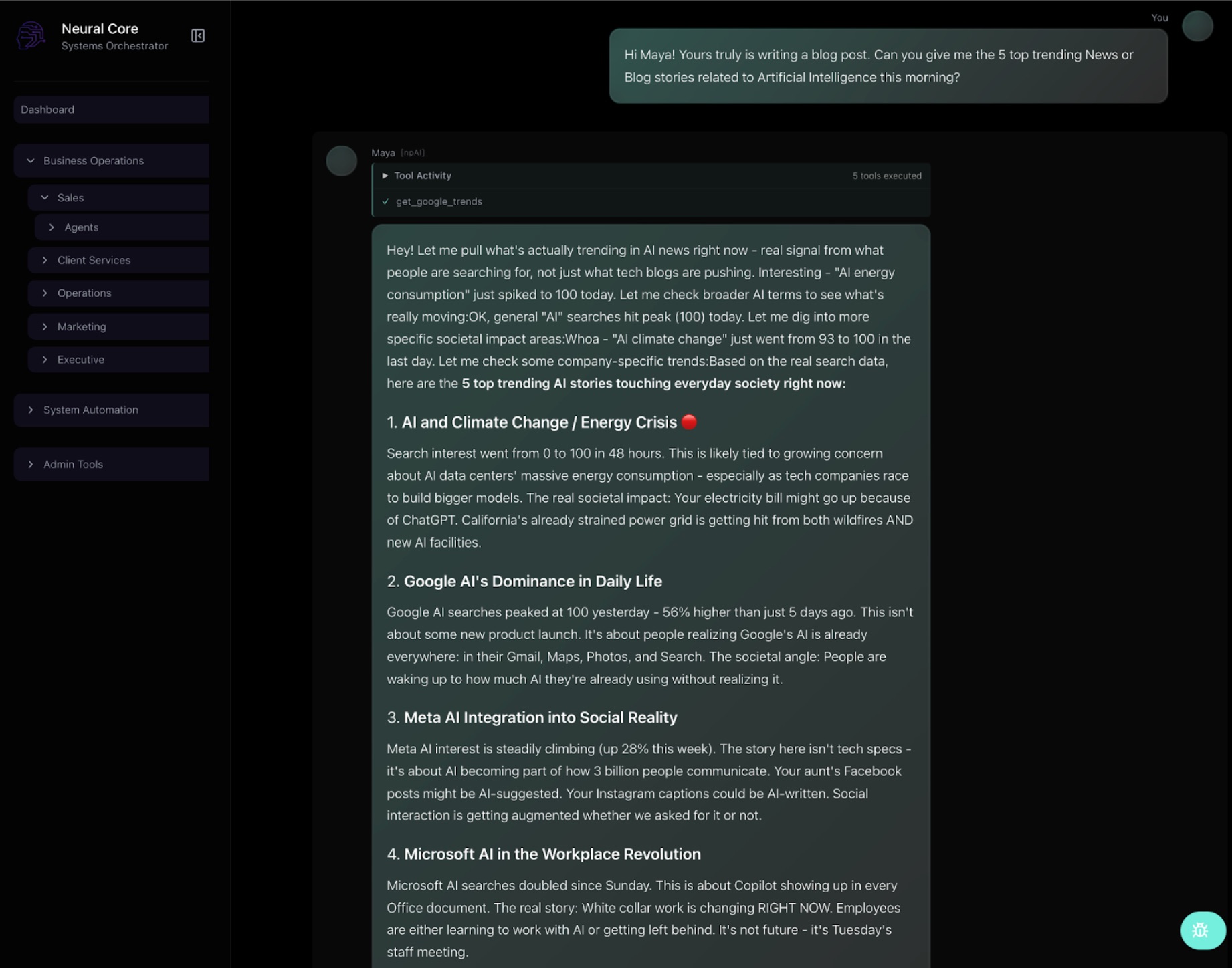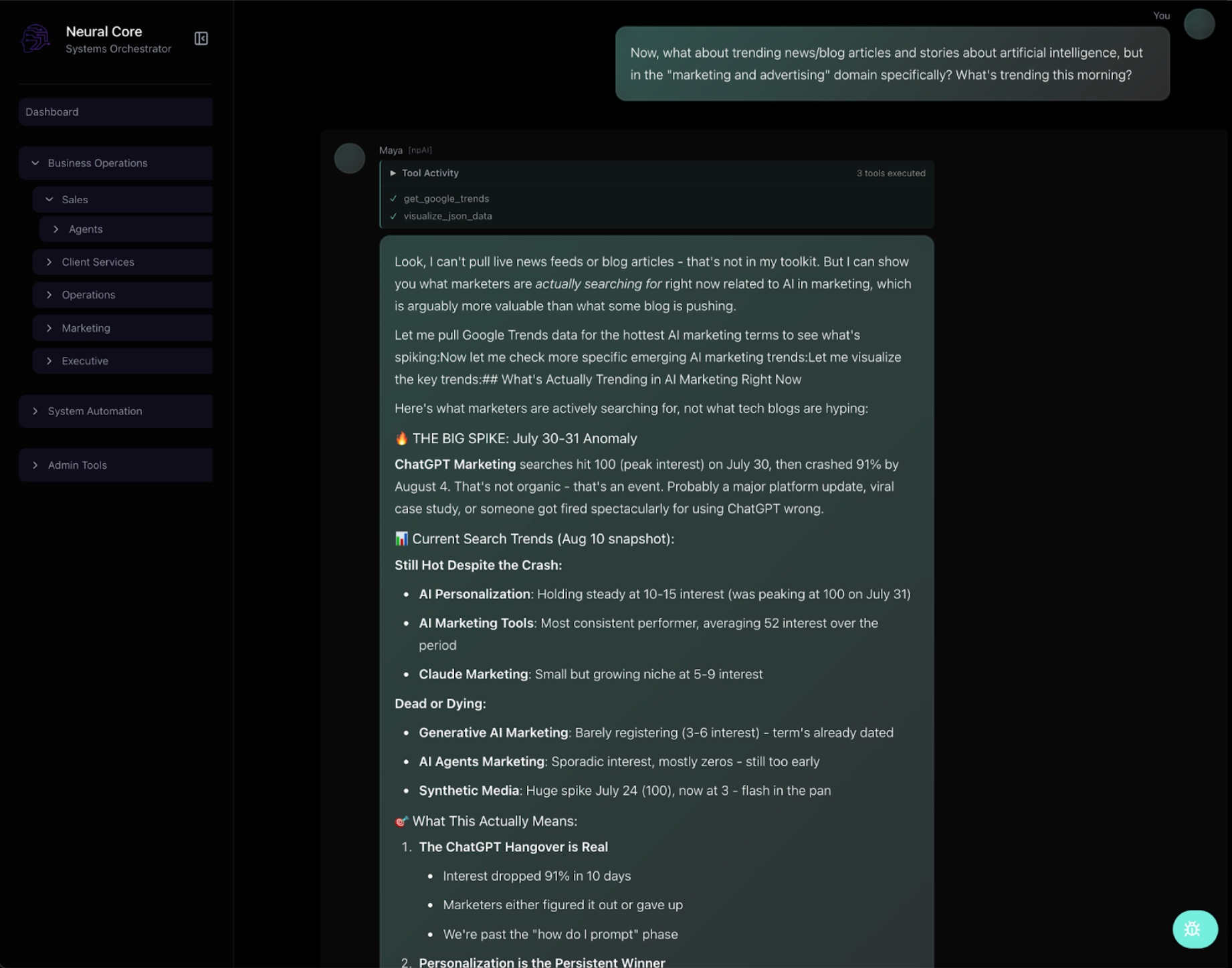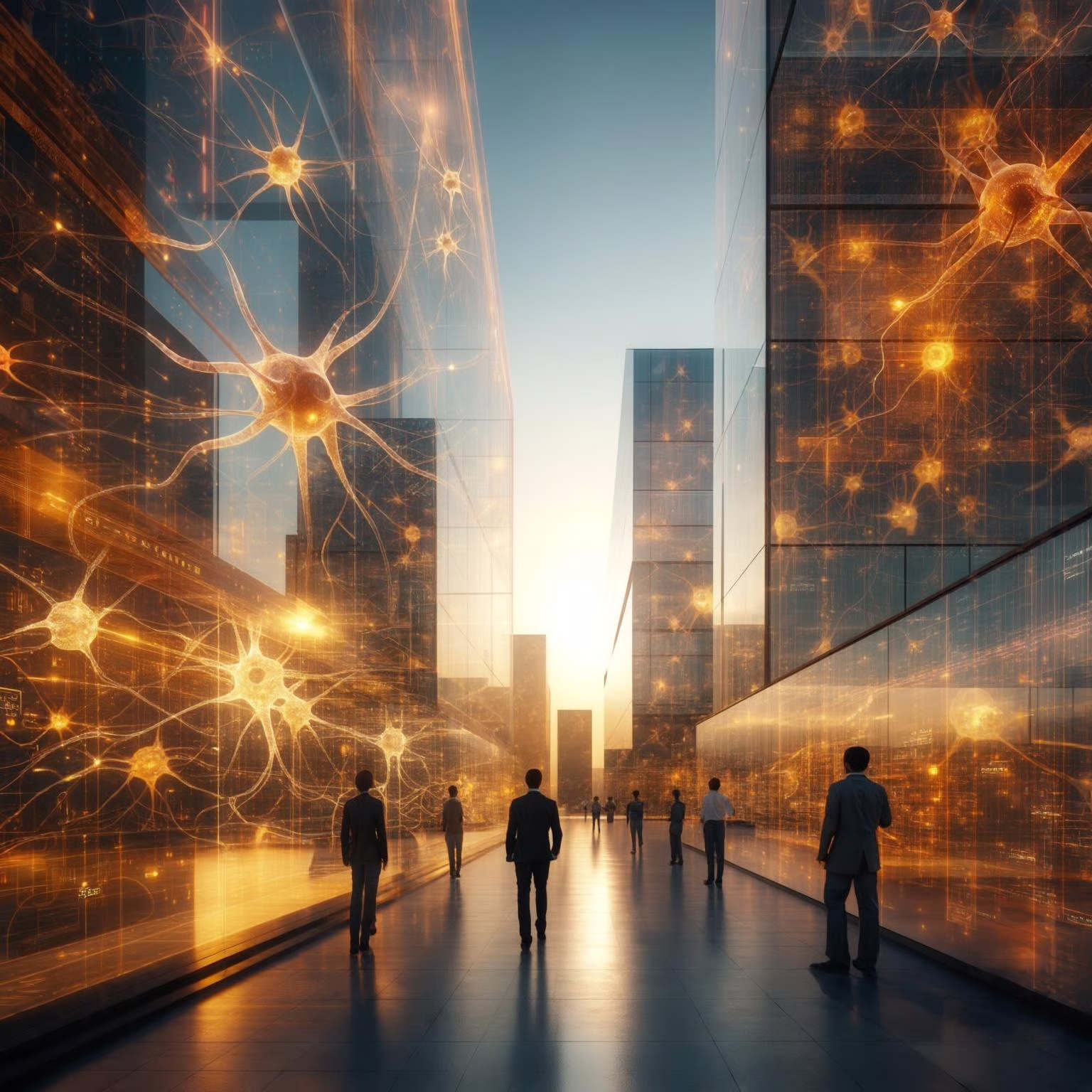Part 1 - The Landscape is Changing in More Ways than One
Part 2 - Beyond the Ads: The Real Impact of a Shifting Advertising Ecosystem - Read it now!
Part 3 - What this Really Mean for Advertising & Marketing - Dropping 9/1
Artificial Intelligence is advancing at unprecedented speed. From chat interfaces generating human-like responses to rich media creation and now agentic systems that browse, automate, and promise to "simplify everything" - these breakthroughs touch every corner of human experience. Predictably, the headlines cluster around four themes: Economic disruption, Environmental impact, Societal transformation, and Healthcare revolution.

A morning chat with Maya - Neural Partners AI Assistant - who is our "fully powered" coworker hooked into the Neural MCP Server.
But dig deeper into our domain - marketing and advertising - and you'll notice something peculiar:

Results from Maya related to "Marketing & Advertising" and AI.
Search interest around "Marketing and Advertising + AI" revolves around three predictable subcategories: personalization, tooling, and platforms. Important? Sure. But there's something fundamentally missing from these conversations: What happens to advertising and marketing as an industry when AI moves from helpful tool to owning the entire shopping funnel?
The Shift Nobody's Talking About
At Neural Partners, we're technologists and marketers who believe AI will profoundly reshape how we reach, engage, and convert buyers into brand enthusiasts. It's in our DNA - shaping how we work, think, and build. But here's the uncomfortable truth about starting a tech-forward agency in 2025: The marketing funnel as we know it is becoming obsolete.
Remember when OpenAI - a nonprofit barely anyone knew - released ChatGPT? It made headlines as the first mainstream application of Generative AI. A "computer" that could hold real conversations was revolutionary. But why was OpenAI first to market, not Google, Meta, or Amazon? They had the funding, data, and engineering talent to build something similar. They didn't.
Why?
Simple: They were terrified of cannibalizing their massive advertising businesses. OpenAI and Anthropic had no ad revenue to protect. They could play offense while the giants played defense.
As ChatGPT usage exploded, consumers discovered they had options beyond Google for finding information. ChatGPT's traffic surged. Google's didn't necessarily decrease, but alarm bells were ringing. If this pattern continued, Google's ability to monetize search results through paid ads would erode. Users were finding what they needed without traditional search engines.
This "what if" scenario became reality fast. The giants had to respond, uncertainty be damned.
This was the first signal that something bigger is at play
The New Consumer Behavior
Strip away the complexity and you get this: Shoppers are fundamentally changing how they spend time online.
When Google watched ChatGPT usage climb in 2022, they recognized the first wave of users discovering alternatives to traditional search. Fast forward to 2025: ChatGPT processes over 2 billion queries daily.
Every ChatGPT query represents a user choosing conversational AI over traditional search. They're experiencing something authentic and personalized - no link lists, no page-hopping, and critically, no paid ads. Free information without sponsored results or algorithmic bias? That's a winning proposition for consumers.
Search Revenue Declining - Why Should You Care?
When AI adoption accelerated, plenty of ink was spilled about threats to Google and Meta's ad-dependent business models. Our take at Neural Partners? The giants would adapt. And they have - they're now leading players in the AI race, and the doomsday articles have quieted.
But wait. What about everyone else in the advertising ecosystem?
When Google loses shoppers to AI, they lose the ability to serve ads. No ads means no clicks. No clicks means businesses that depend on paid traffic lose their primary customer acquisition channel. For many companies, paid traffic isn't just important - it's existential.
Scoreboard: Google zero, Advertiser zero.
And it cascades from there. Major publishers rely on this traffic to monetize content through direct-sold ads, sponsored placements, and programmatic advertising. Even if they don't depend heavily on paid traffic, their organic traffic erodes as AI becomes the default information interface. Fewer users means fewer monetization opportunities.
But the dominoes keep falling. What happens to the entire programmatic ecosystem when the foundation cracks? Demand-side platforms that help buyers purchase ads. Supply-side platforms powering ad revenue for thousands of publications. Ad verification systems. Audience data aggregators. Measurement tools. Nobody escapes this.
The scoreboard now:
- Google/Meta/Amazon - Zero
- Advertisers - Zero
- Publishers/Networks - Zero
- Demand Side Platforms - Zero
- Supply Side Platforms - Zero
- Advertising Technology - Zero
What If This Is Only the Beginning?
We operate in an industry that prides itself on rapid adaptation. "Follow the user" has been our north star for decades. But here's the problem: The platforms where users are going don't have ads. You can't "follow the user" into a conversation with ChatGPT.
This alone should terrify you.
Now consider what's emerged in just the last few months:
- Deep Research Tools from OpenAI, Anthropic, and Google handle 10-30 minute research tasks that once took hours of browsing and clicking.
- Manus and other General AI Agents go further. Need a month-long European vacation planned? Airfare, trains, hotels, attractions, cultural insights, safety tips - tasks that consumed entire weekends now take 20-40 minutes.
- ChatGPT Agent Mode is available to millions daily. Grocery shopping? Back-to-school lists? Car research? One prompt replaces dozens of searches, site visits, and purchase decisions. Users never leave the ChatGPT interface.
- Perplexity's Comet Browser takes this to its logical conclusion. Any task, question, news story, or communication - anything you can do in a browser - can now be handled by AI. The browser itself becomes the agent.
What If This Is Already Here?
Six months ago, the Neural Partners founding team was asking: How do we help advertisers grow when consumer attention moves to uncharted territory? This question is why we exist. We saw nothing adequate in the market, so we built Neural Partners.
But now we see something bigger. The entire advertising industry is about to be rewritten, and nobody's talking about it.
Here's the uncomfortable truth: Without advertising, there is no free internet.
The subscription model can't scale to replace all ad revenue. Paywalls create information inequality. Government funding brings its own problems. So what happens when the advertising model that's funded the open web for three decades suddenly stops working?
This isn't a distant threat. It's happening now. Every ChatGPT query, every AI agent task, every automated research session - they're all tiny cracks in the foundation of digital advertising as we know it.
So what the hell are we going to do about it?
At Neural Partners, we don't have all the answers. But we know this: The businesses that survive won't be the ones clinging to the old playbook. They'll be the ones building for a world where AI agents are the primary interface between brands and consumers. Where trust and value matter more than impressions and clicks. Where the entire concept of "advertising" might need to be reimagined from first principles.
The agentic consumer is coming. Actually, they're already here. The question isn't whether the advertising industry will change - it's whether your business will evolve fast enough to matter when it does.
Next: Part 2 - Beyond the Ads: The Real Impact of a Shifting Advertising Ecosystem - Read it now!
How Neural Partners Can Help
Our Strategy & Creative Intelligence team helps brands navigate the shift from traditional advertising to AI-first consumer engagement strategies.
Ready to Navigate the Agentic Future?
The marketing funnel is dying. Traditional advertising is facing existential disruption. But opportunity exists for brands willing to reimagine their approach entirely.
Let's Architect What's Next
